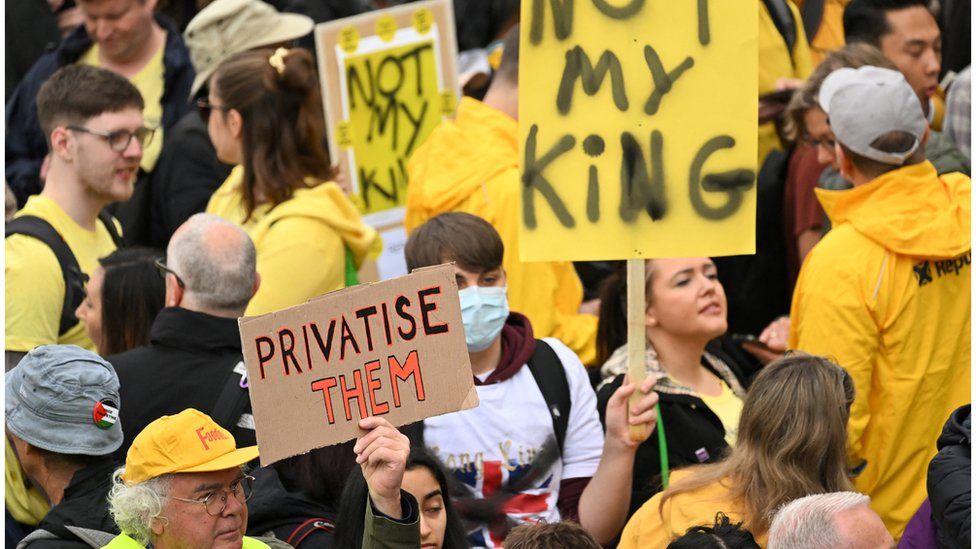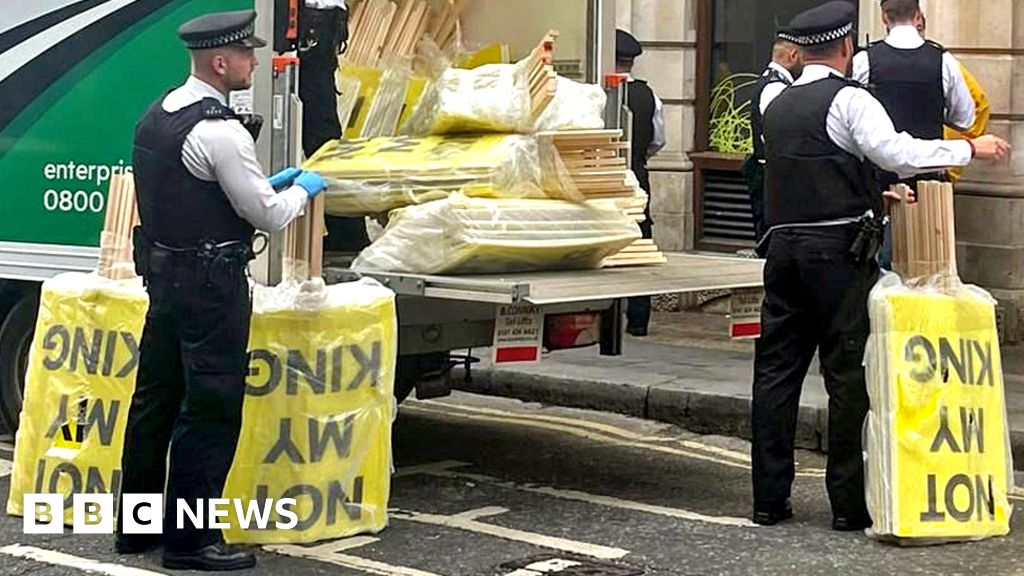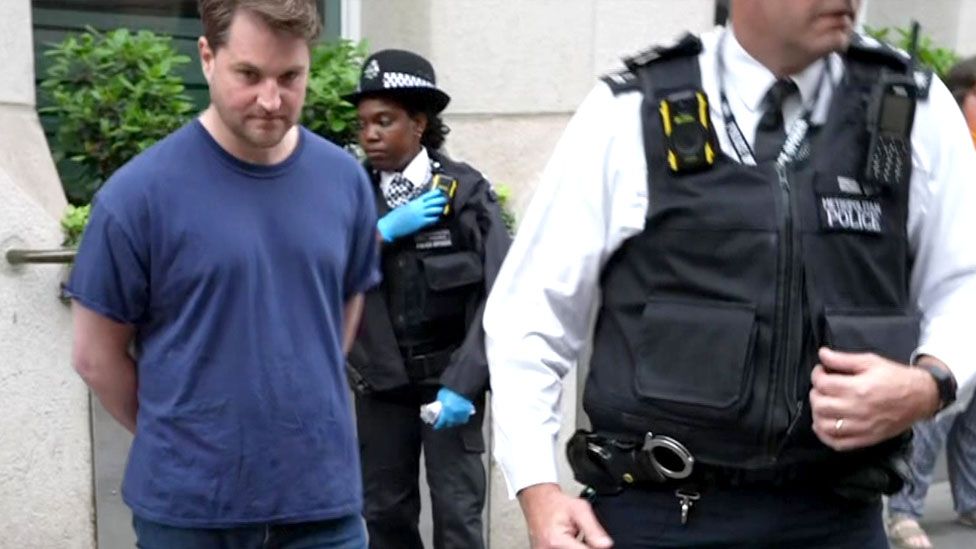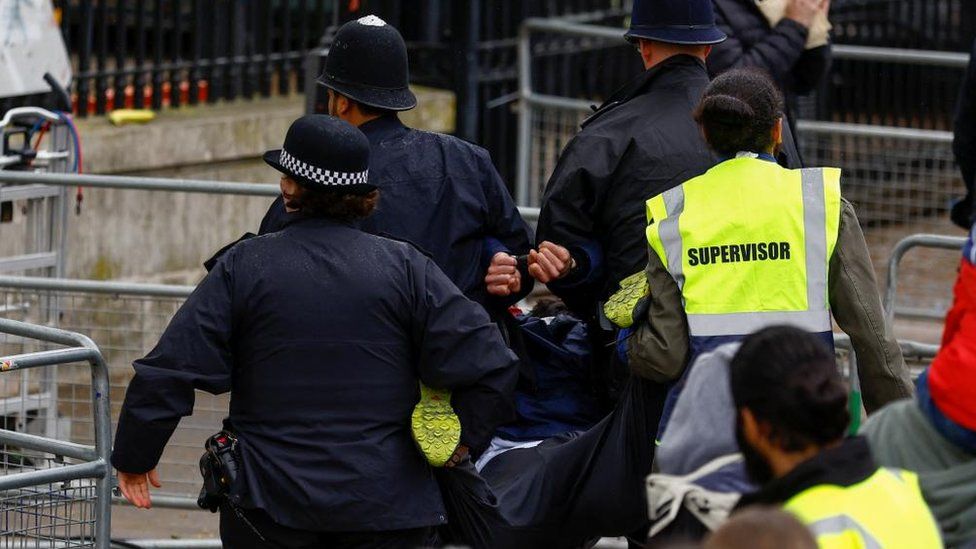This video can not be played
To play this video you need to enable JavaScript in your browser.
A controversial new law under which six anti-monarchy protesters were arrested on Coronation day has been criticised as too crude and too broad.
Conservative MP David Davis has called for the law to be scrutinised by the Home Affairs Select Committee.
Ex-Greater Manchester police chief Sir Peter Fahy said “poor police officers” were left to interpret the law “passed only a few days” before the Coronation.
But Prime Minister Rishi Sunak said the law was “the right thing to do”.
The Metropolitan Police has expressed “regret” over the arrests after a review found there was no proof the six protesters, who were arrested when their vehicle was stopped near the procession route, were planning to use “lock on” devices.
In total, 64 protesters were arrested on Saturday.
‘Too crude and too broad’
Former cabinet minister David Davis was the only Conservative MP to vote against the changes to the Public Order Bill.
He told the Today programme: “There’s too many elements of the law that are too crude and too broadly defined.”
He added: “No-one wants a day ruined, but the right to put up placards is virtually absolute in British democracy.”
Former Greater Manchester police chief Sir Peter said he gave evidence in Parliament expressing his concern that the new law was “poorly defined and far too broad”.
He told BBC Radio 4’s Today programme: “We see the consequences of that, particularly for the poor police officers who have to make sense of legislation that was only passed a few days ago.”
He added: “The government have actually reduced the amount of discretion the police have in getting the balance right.”

What is the 2023 Public Order Act?
The 2023 Public Order Act is the government’s second major piece of legislation changing protest laws in under two years.
In 2022 MPs voted to place greater restrictions on public processions if they are too noisy.
The new act goes further:
• Protesters who interfere with “key national infrastructure” including roads and railways can face 12 months in jail.
• Anyone who fixes themselves to an object or building to create an immovable obstacle, a tactic known as “locking on”, could be jailed for six months.
• The law bans protesters from committing acts of “serious disruption” – meaning demonstrations which prevent people going about their day-to-day activities.
• Other new offences include up to three years in jail for tunnelling as part of a protest. Police will also have new powers to search people for super-glues and padlocks.

Graham Smith, chief executive of anti-monarchy group Republic, was one of those arrested and said he will take legal action against the Metropolitan Police after he was arrested and released without charge by police after changes to the Public Order Act.
The demonstrators, who were arrested because of suspicions about luggage straps in their hire van, were detained from 06:40 to 23:00 BST.
Republic were subject to the first application of the new Act, which was passed into law last Tuesday.
The law created new offences of “locking on” and “going equipped” to lock on to buildings, street furniture, and other people.
Mr Smith, who is from Bristol, said he had received a personal apology, but it was not enough.
‘Police will make decisions’
Police have been under a lot of pressure from politicians over how they handle protests with recent actions by Just Stop Oil a focus for changes to the Public Order Act after demonstrators caused significant disruption.
Only two weeks ago, in a testy exchange at a Home Affairs Committee hearing, the deputy chairman of the Conservative Party Lee Anderson said to Metropolitan Police Commissioner Sir Mark Rowley: “Do you think it’s time that you left the ivory tower and got out there on Whitehall and sorted these people out?
“The people of London, the tourists, the people that work at this place… the taxi drivers, the bus drivers, they’re getting fed up of it, and you’re just letting it happen.”
Rishi Sunak defended the new legislation, telling broadcasters: “What the government has done is give the police the powers that they need to tackle instances of serious disruption to people’s lives.
“I think that is the right thing to do and the police will make decisions on when they use those powers.”
Asked if nothing about the Republic arrests made him feel uncomfortable, the prime minister told broadcasters police are “rightly, operationally independent of government”.
He added: “It wouldn’t be right for me to interfere with their operational decisions but it is right for the government to give the police the powers to tackle serious disruption.”
‘Something has gone wrong’
London Mayor Sadiq Khan has requested “further clarity” from Scotland Yard, saying the right to peaceful protest is an integral part of democracy.
He tweeted: “While it’s vital the police are able to keep us safe, it must be balanced with protecting the right to peaceful protest – an integral part of democracy.”
Shadow housing minister Lisa Nandy said “clearly something has gone wrong” in the handling of Mr Smith’s case, and expressed her support for a review into the matter.
However, she said Labour was not committing to “wholesale repeal” of the new law, which has been criticised for clamping down on the rights of peaceful protesters.
She told BBC Breakfast: “If there is a problem with the legislation, of course we’ll rectify that in government, but we’re not into wholesale repeal of legislation without understanding what the actual problem is first.”
Liberty, which defends civil liberties, said the government “rushed through” the Public Order Act ahead of the Coronation.
“This is the second piece of draconian legislation in just over a year brought in to crack down on our right to protest,” Sam Grant, the organisation’s advocacy director said.

Hundreds of protesters gathered across the UK as the Coronation took place.

Related Topics
-
-
3 days ago

-


